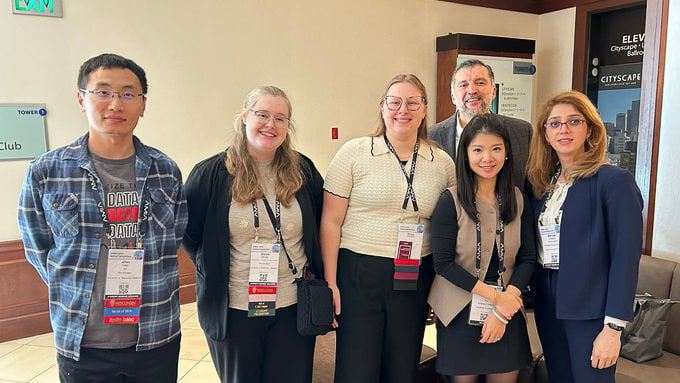From technology giants and renowned health institutions to dynamic startups, AI-powered healthcare innovations, local leaders, delicious food, and great views, San Francisco proved to be the perfect location for the American Medical Informatics Association (AMIA) to hold its 2024 Annual Symposium. Faculty, researchers, and students gathered from across the country to dive into informatics in the age of generative artificial intelligence (AI).

Left: University of Colorado representative at the DBMI table. Right (top to bottom): Yanjun Gao, PhD with colleagues (photo credit: Yanjun Gao, PhD), DBMI stress balls shaped like brains, and the view of San Francisco from the hotel (photo credit: Yanjun Gao, PhD).
For faculty and trainees from the University of Colorado School of Medicine and the University of Colorado Anschutz Medical Campus, the event presented a unique opportunity to showcase their cutting-edge research, forge valuable connections with leading experts, and gain deeper insights into the transformative potential of AI in healthcare. This gathering allowed attendees to engage in meaningful discussions about the future of AI applications across various areas of medicine, from clinical decision support to personalized treatment plans.
Representatives from the Department of Biomedical Informatics played a prominent role in this event, contributing their expertise and research on AI and health informatics. Among those present were Tell Bennett, MD, MS, vice chair of clinical informatics, and David Albers, PhD, associate professor of biomedical informatics and AMIA committee member, along with Jennifer Briggs, Yanjun Gao, PhD, James Mitchell, PhD, Mustafa Ozkaynak, PhD, and Samantha Stonbraker, PhD, MPH, RN. These individuals shared their latest findings, participated in thought-provoking discussions, and engaged with peers and industry leaders about the growing impact of AI on healthcare delivery, data analytics, and medical decision-making. The event was an invaluable experience for faculty, researchers, and trainees looking to stay at the forefront of innovation in medical informatics and AI.
The much anticipated Biomedical and Health Informatics Year-in-Review featured a paper by David Albers, PhD, associate professor of biomedical informatics, Melike Sirlanci, PhD, assistant professor of biomedical informatics, and colleagues from the California Institute of Technology and Columbia University. The paper, “Interpretable physiological forecasting in the ICU using constrained data assimilation and electronic health record data” focuses on improving the prediction of physiological processes—like blood sugar levels or heart rate—using electronic health record (EHR) data from patients in the intensive care unit (ICU). The challenge is that data available in these records are often sparse and non-stationary. This study developed a new method for forecasting blood glucose levels using a glucose-insulin model integrated into a data assimilation (DA) framework, specifically the constrained ensemble Kalman filter (CEnKF). The method was applied to a data set from tube-fed patients, whose complex nutrition, insulin administration, medications, and blood glucose levels were fed into the method as if the data arrived in real-time. Albers and the team found the new method, CEnKF, improved the reliability and accuracy of predictions compared to the traditional unconstrained ensemble Kalman filter. One of the key advantages of CEnKF is that it needs less data to make accurate predictions, which is important when data are limited.

A slide during the final presentation, highlighting the paper from David Albers, PhD, and team.
The AMIA Symposium offered invaluable opportunities to collaborate, learn, and help shape the future of medical informatics, emphasizing the increasing impact of AI on patient care and healthcare systems. We're excited to continue bridging the gap between data and medicine, working to improve patient outcomes at the bedside. As we look ahead to the coming year, we eagerly anticipate the advancements in clinical informatics and look forward to reconnecting with colleagues in Atlanta in 2025.



.png)
.jpg)